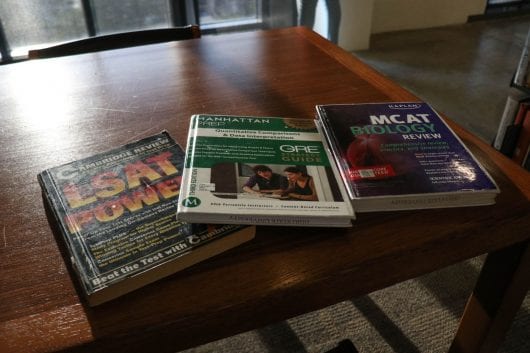
The LSAT, MCAT and GRE are popular standardized tests used for graduate school admissions. Credit: Casey Cascaldo | Photo Editor
No. 2 pencils, photo IDs and … metal detectors? Standardized tests are no walk in the park, and taking the actual test can be just as anxiety-inducing as the studying. When your post-undergraduate career depends on the results of a test, it’s important to stay cool under pressure, especially when the tests last for hours at a time.
The GRE graduate school entry exam is required for most graduate school programs, ranging from English master’s programs to STEM doctoral programs. The test takes three hours and 45 minutes, but Andrea Thompson, a fourth-year in psychology, said the arduous registration and security processes make the test seem even longer.
“You can’t bring anything in with you. [Test administrators] use a metal detector before you come back into the room,” Thompson said. “I’ve been through customs at airports, and that was less security.”
Thompson, who is currently applying to clinical psychology doctoral and social work programs, took the GRE in November and said it was important to pace herself and use her energy wisely.
“It’s really easy to burn yourself out fast because the two essays are at the beginning,” Thompson said. “If I could redo one thing, it’d be to focus on those more. That way I felt more prepared for them and didn’t use a ton of mental energy on the first part of the exam.”
The beginning of the exam consists of two handwritten essays, one regarding a general issue of interest and one argumentative, each lasting 30 minutes. The rest of the exam sections are in multiple-choice format, with only a one-minute break between each section, aside from the second multiple choice section, in which test takers have 10 minutes to complete, according to Princeton Review.
The LSAT aptitude test requires just as much preparation and focus as any other standardized test, lasting four to five hours.
Lila Appaya, a fourth-year in psychology, took the LSAT in January and noted the importance of staying relaxed before she took the exam.
“It’s especially important that you do this the day before,” Appaya said. “I went and worked out, had a healthy lunch and dinner, went to bed early. At that point, reviewing or trying to learn new things isn’t going to help you on the exam, so it’s better not to stress about it and just take it easy.”
The morning of the exam, Appaya practiced staying calm by waking up early and not stressing herself out.
“I got up at 6 a.m., showered so I felt awake, looked over some of my strategies for how I was going to approach each section,” Appaya said. “Some people do some logical reasoning problems to warm up, but I didn’t do this.”
The LSAT consists of five multiple-choice sections with a 15-minute break after the third section and a writing sample at the end, according to Kaptest. The total testing time is three hours and 30 minutes, so sustaining energy is key in this endeavor.
Appaya said that while some people opted to bring hearty sandwiches, she brought lighter snacks.
“I brought a water bottle and then oranges and nuts and some crackers,” Appaya said. “I tried to pack things that would give me lots of fuel, but personally, I can’t eat a lot when I’m nervous, so I didn’t pack much food for the break.”
Clocking in at seven hours and 30 minutes, the Medical College Admission Test, MCAT, requires long-lasting focus and energy. The test is comprised of four sections; however, there are 10-minute optional breaks between each section, according to MCAT-Prep.
Christy Sharrer, Ohio State alumna and current special master’s in physiology student at the University of Cincinnati, took the MCAT in 2017 and cited the importance of staying mindful through deep breathing.
“Managing anxiety during the test, I just would remind myself of all of the hard work I had been doing,” Sharrer said. “Don’t be afraid to take a mindful moment. Let yourself just focus on your breath for a few minutes if you catch yourself freaking out.”
Similarly to Thompson, Sharrer also likened security for the exam to that of airports.
“Don’t be the guy in a three-piece suit because you’ll have to be scanned with a security wand every time, and that time you spend in line getting back in the room is taken out of your break time,” Sharrer said. “It’s almost more stressful than going through airport security.”
For undergraduate students looking for resources to prepare for graduate school examinations, the Career Counseling and Support Services in the Younkin Success Center offers various resources and counseling sessions for graduate opportunities.


